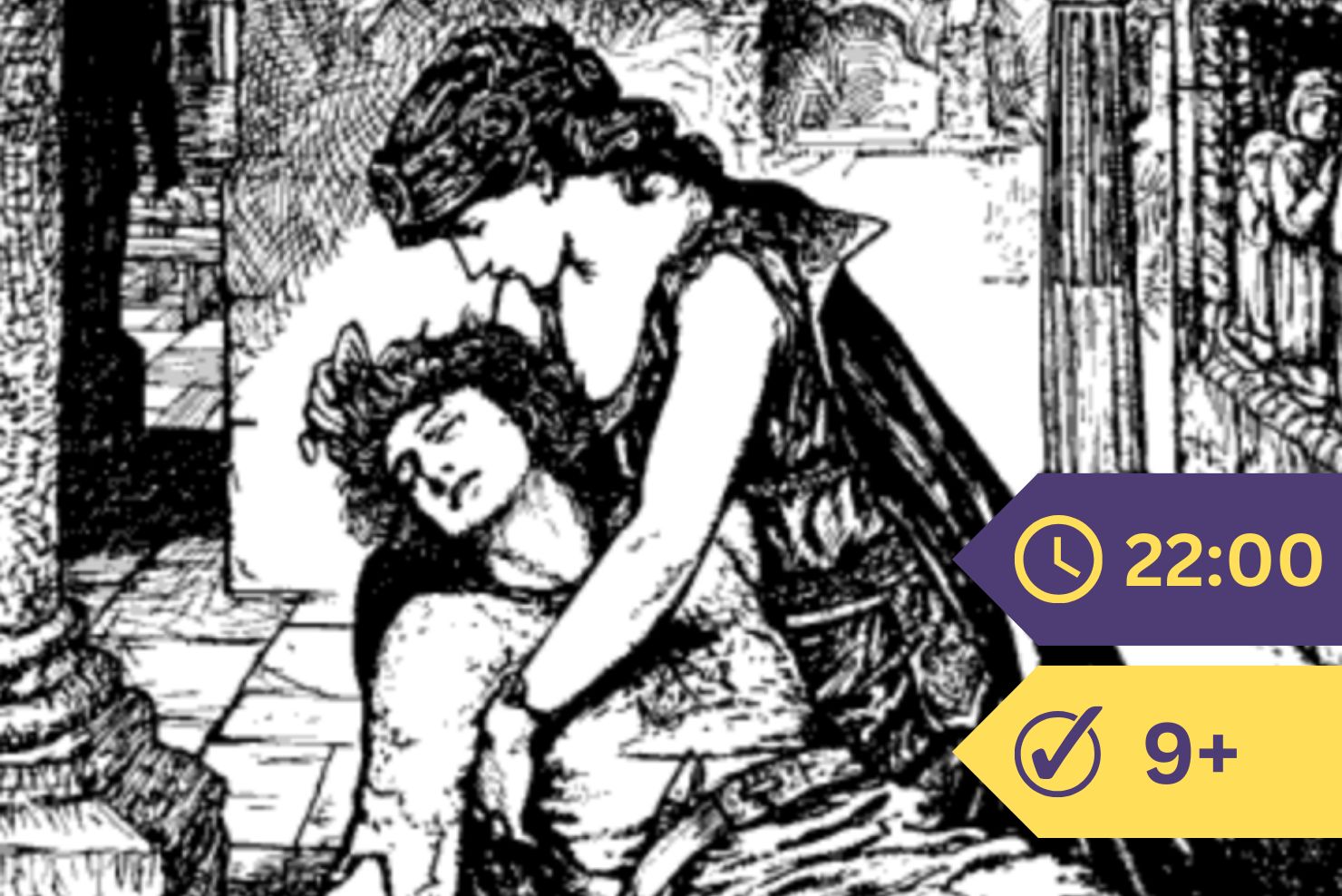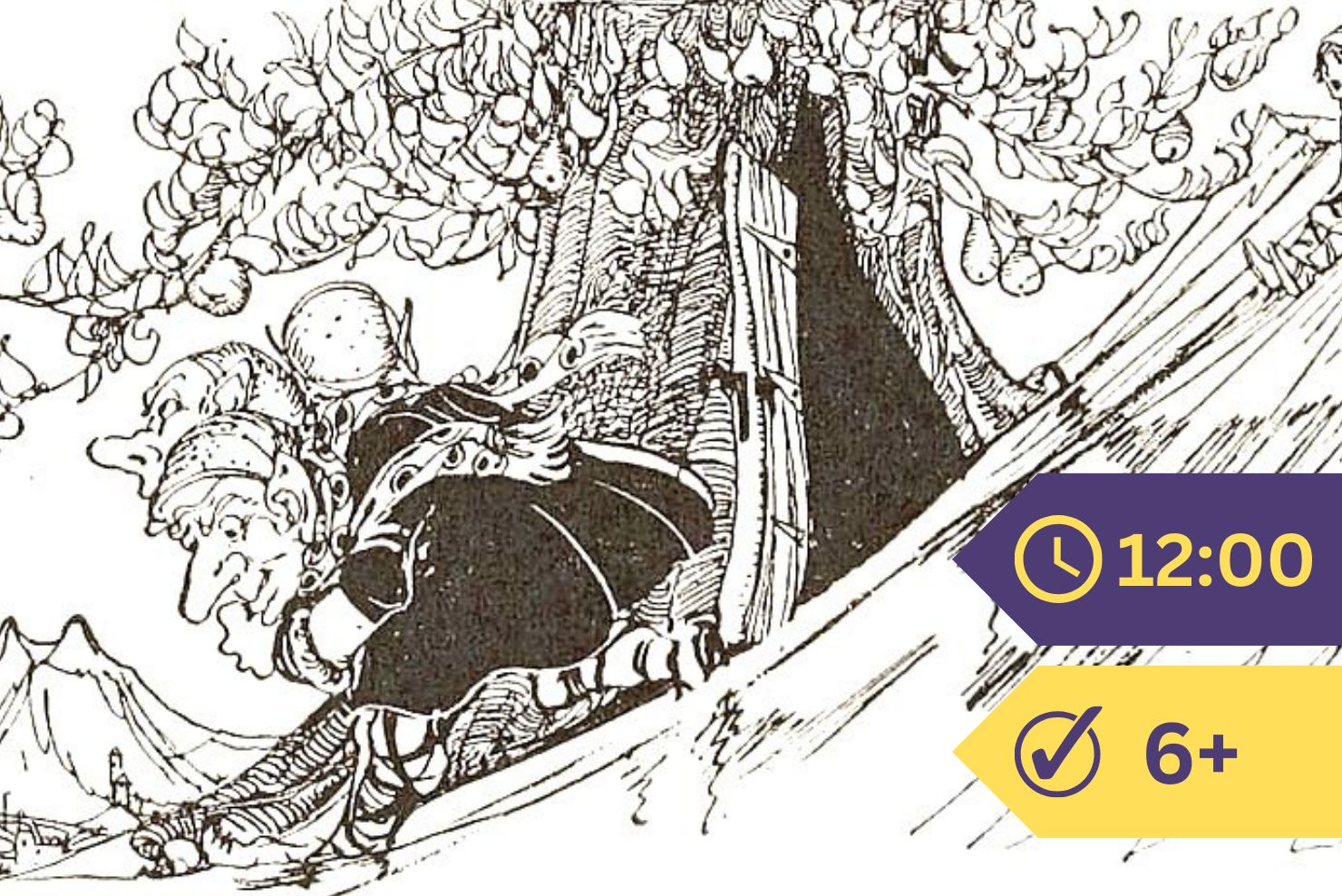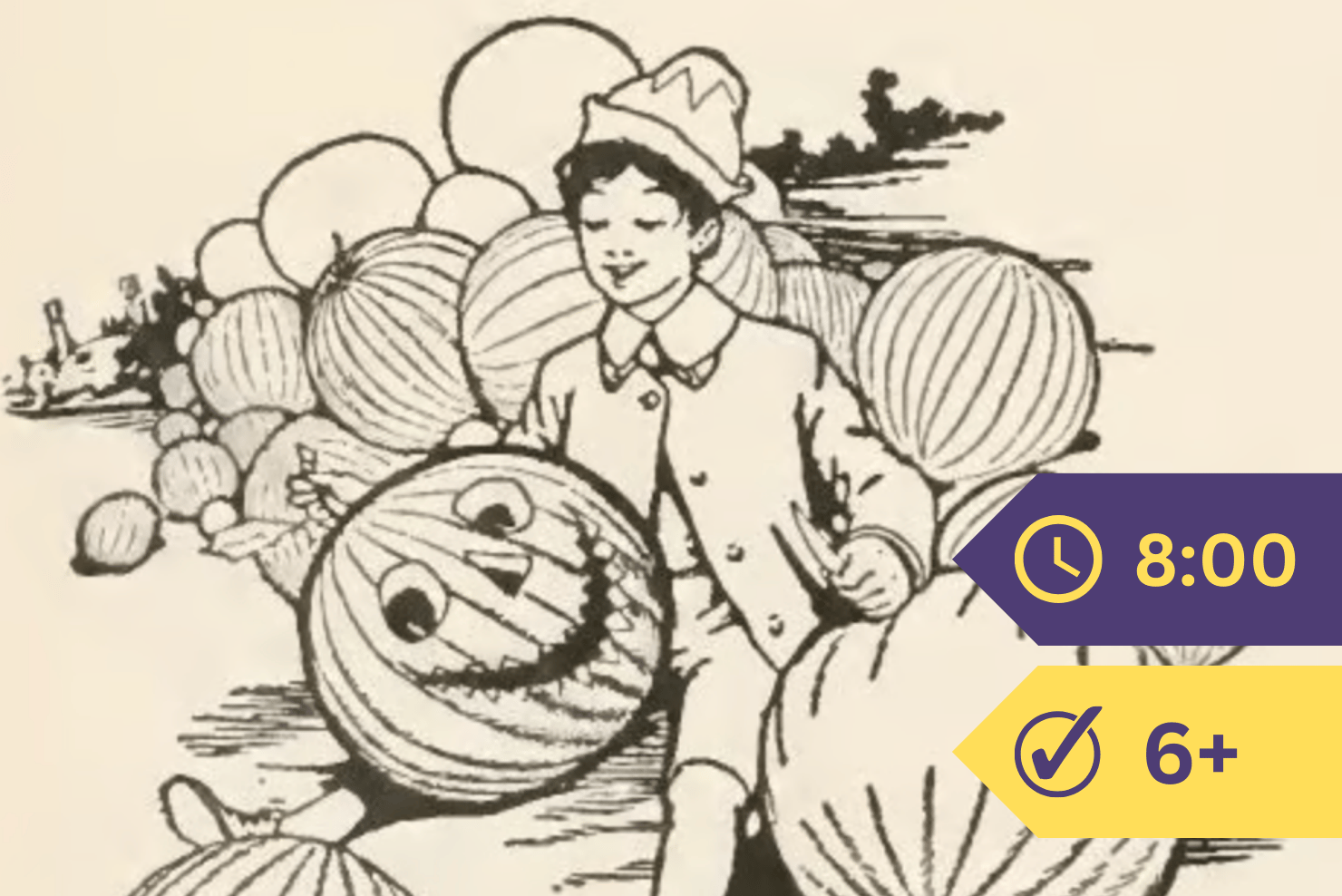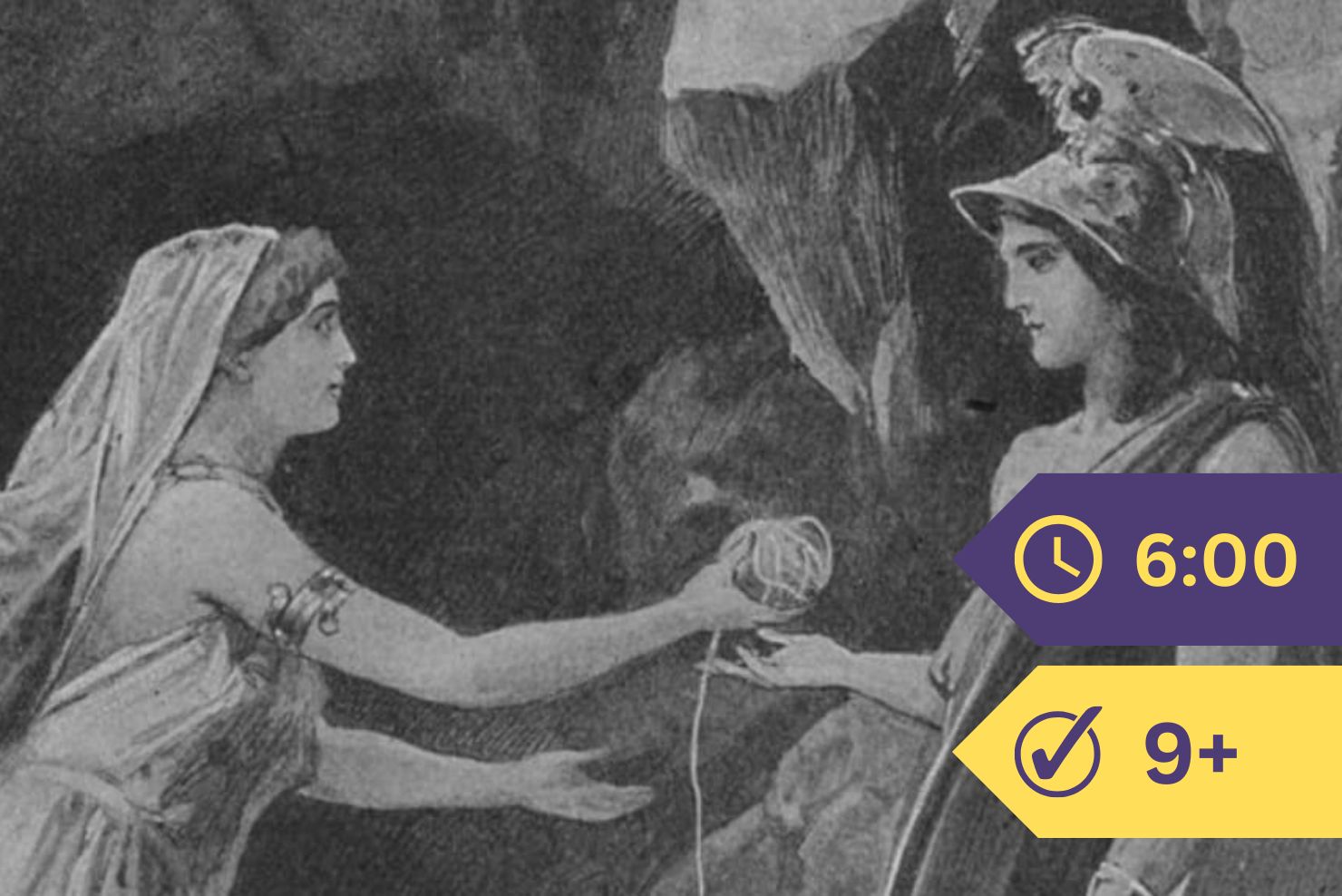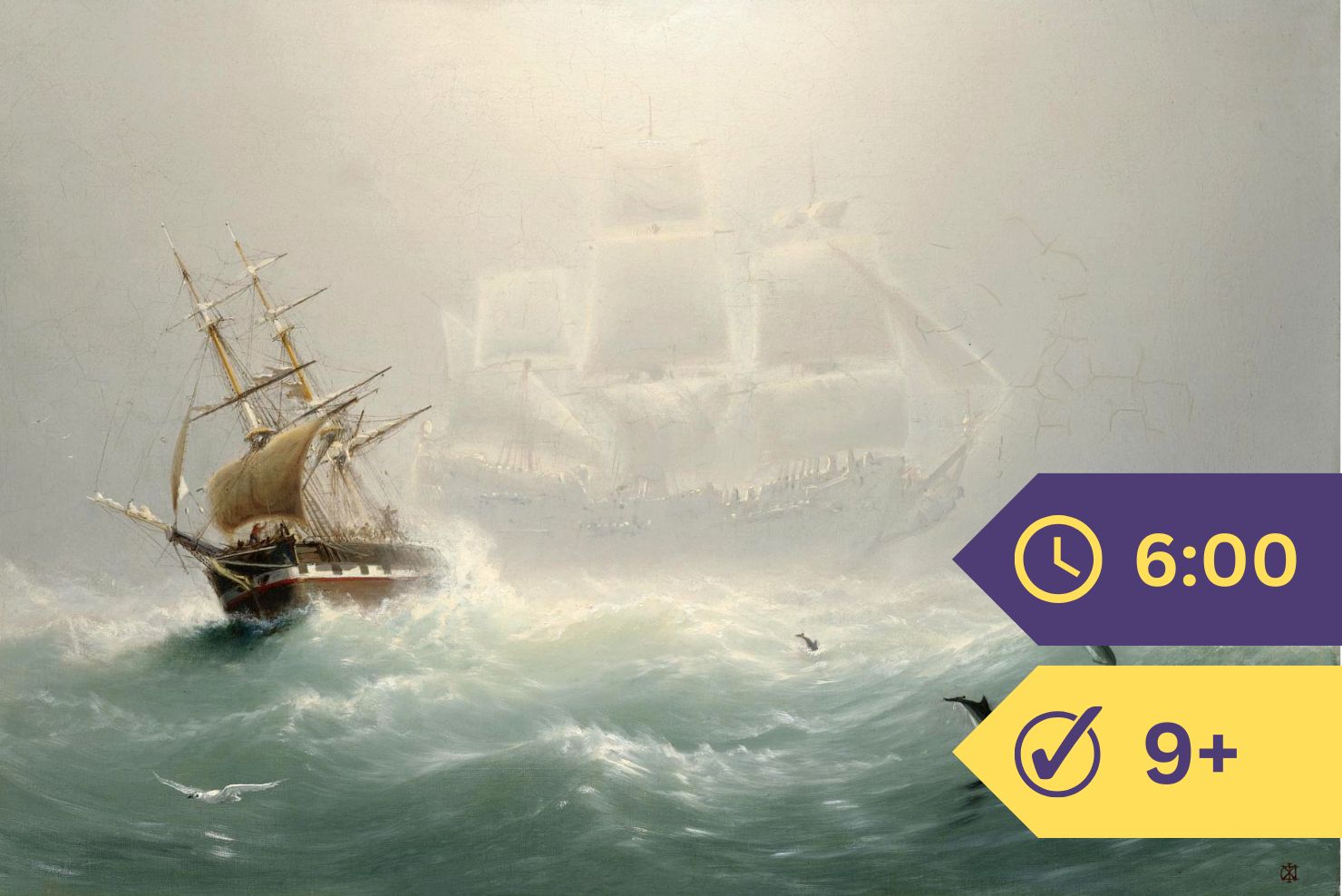Merlin took up King Arthur, and rode forth with him upon the knight’s horse. As they rode King Arthur said, “I have no sword.”
“No matter,” said Merlin, “hereby is a sword that shall be yours, Sir King.”
So they rode till they came to a lake, which was a fair water and a broad; and in the midst of the lake King Arthur was aware of an arm clothed in white samite, that held a fair sword in the hand.
“Lo,” said Merlin unto the king, “yonder is the sword that I spake of.”
With that they saw a damsel going upon the lake. “What damsel is that?” said the king.
“That is the Lady of the Lake,” said Merlin, “and within that lake is a reach, and therein is as fair a place as any is on earth, and richly beseen; and this damsel will come to you anon, and then speak fair to her that she will give you that sword.”
Therewith came the damsel to King Arthur and saluted him, and he her again. “Damsel,” said the king, “what sword is that which the arm holdeth yonder above the water? I would it were mine, for I have no sword.”
“Sir king,” said the damsel of the lake, “that sword is mine, and if ye will give me a gift when I ask it you, ye shall have it.”
“By my faith,” said King Arthur, “I will give you any gift that you will ask or desire.”
“Well,” said the damsel, “go ye into yonder barge, and row yourself unto the sword, and take it and the scabbard with you; and I will ask my gift when I see my time.”
So King Arthur and Merlin alighted, tied their horses to two trees, and so they went into the barge. And when they came to the sword that the hand held, King Arthur took it up by the handles, and took it with him: and the arm and the hand went under the water, and so King Arthur came to the land, and rode forth. Then the king looked upon the sword, and liked it passing well.
“Whether liketh you better,” said Merlin, “the sword or the scabbard?”

“Me liketh better the sword,” said King Arthur.
“Ye are more unwise,” said Merlin; “for the scabbard is worth ten of the sword; for while ye have the scabbard upon you ye shall lose no blood, be ye never so sore wounded; therefore keep well the scabbard alway with you.”
Then Arthur proclaimed that all the lords, knights, and gentlemen of arms, should draw unto a castle, that was called in those days Camelot, and the king would have a council-general and a great joust. So when the king was come thither, with all his baronage, and lodged as them seemed best, there came a damsel, sent on message from the great Lady Lily, of Avilion; and, when she came before King Arthur, she told him from whom she came, and how she was sent on message unto him for these causes. And she let her mantle fall, that was richly furred, and then she was girded with a noble sword, whereof the king had great marvel, and said, “Damsel, for what cause are ye gird with that sword? It beseemeth you not.”
“Now shall I tell you,” said the damsel. “This sword, that I am gird withal, doth me great sorrow and remembrance; for I may not be delivered of this sword but by a good knight; and he must be a passing good man of his hands and of his deeds, and without villany or treachery. If I may find such a knight that hath all these virtues, he may draw out this sword of the scabbard. For I have been at King Rience; for it was told that there were passing good knights, and he and all his knights have assayed it, and none can speed.”
“This is a great marvel,” said King Arthur, “and if besooth, I will myself assay to draw out the sword; not presuming upon myself that I am the best knight, but that I will begin to draw at your sword, in giving example to all the barons, that they shall assay every one after other, when I have assayed.”
Then King Arthur took the sword by the scabbard and girdle and pulled at it eagerly, but the sword would not out.
“Sir,” said the damsel, “ye need not pull half so hard; for he that shall pull it out shall do it with little might.”
“Ye say well,” said King Arthur: “now assay ye, all my barons; but beware ye be not defiled with shame, treachery, nor guile.”
“Then it will not avail,” said the damsel; “for he must be a clean knight, without villany, and of gentle stream of father’s side and mother’s side.”
Most of all the barons of the Round Table, that were there at that time, assayed all in turn, but none might speed. Wherefore the damsel made great sorrow out of measure, and said, “Alas! I weened in this court had been the best knights, without treachery or treason.”
“By my faith,” said King Arthur, “here are as good knights as I deem any be in the world; but their grace is not to help you, wherefore I am greatly displeased.”
It happened so, at that time, that there was a poor knight with King Arthur, that had been prisoner with him half a year and more, for slaying of a knight, which was cousin to King Arthur. The knight was named Balin le Savage: and by good means of the barons he was delivered out of prison; for he was a good man named of his body, and he was born in Northumberland. And so he went privily into the court, and saw this adventure, whereof his heart rose, and would assay it as other knights did; but for because he was poor, and poorly arrayed, he put him not far in press. But in his heart he was fully assured (if his grace happened him) as any knight that was there. And, as that damsel took her leave of King Arthur and the barons, this knight, Balin, called unto her, and said, “Damsel, I pray you of your courtesy, to suffer me as well to assay as these lords; though I be poorly clothed, in mine heart meseemeth I am fully assured as some of these other lords, and meseemeth in my heart to speed right well.”
The damsel beheld the poor knight, and saw he was a likely man; but, because of his poor array, she thought he should be of no worship without villany or treachery. And then she said to the knight Balin, “Sir, it is no need to put me to any more pain or labour; for beseemeth not you to speed there as others have failed.”
“Ah, fair damsel,” said Balin, “worthiness and good graces and good deeds are not all only in raiment, but manhood and worship is hid within man’s person; and many a worshipful knight is not known unto all people; and therefore worship and hardiness is not in raiment and clothing.”
“By God!” said the damsel, “ye say truth; therefore ye shall assay to do what ye may.”
Then Balin took the sword by the girdle and scabbard, and drew it out easily; and when he looked upon the sword, it pleased him well. Anon after Balin sent for his horse and his armour, and so would depart from the court, and took his leave of King Arthur.
The meanwhile that this knight was making him ready to depart, there came into the court a lady, which hight the Lady of the Lake, and she came on horseback, richly beseen, and saluted King Arthur, and there asked him a gift that he had promised her when she gave him the sword.
“That is sooth,” said King Arthur, “a gift I promised you; but I have forgotten the name of the sword which ye gave me.”
“The name of it,” said the lady, “is Excalibur; that is as much to say cut-steel.”
“Ye say well,” said King Arthur. “Ask what ye will, and ye shall have it, if it lie in my power to give it.”
“Well,” said the Lady of the Lake, “I ask the head of the knight that hath won the sword, or else the damsel’s head that brought it. And though I have both their heads I care not; for he slew my brother, a full good knight and true, and the gentlewoman was causer of my father’s death.”
“Truly,” said King Arthur, “I may not grant you either of their heads with my worship; therefore ask what ye will else, and I shall fulfil your desire.”
“I will ask none other thing of you,” said the lady. When Balin was ready to depart, he saw the Lady of the Lake there, by whose means was slain his own mother, and he had sought her three years. And when it was told him that she demanded his head of King Arthur, he went straight to her, and said, “Evil be ye found. Ye would have my head, and therefore ye shall lose yours!” And with his sword lightly he smote off her head, in the presence of King Arthur.
“Alas! for shame,” said the king. “Why have you done so? You have shamed me and all my court. For this was a lady that I was much beholden unto; and hither she came under my safe conduct. I shall never forgive you that trespass.”
“My lord,” said Balin, “me forethinketh much of your displeasure; for this lady was the untruest lady living; and by her enchantment and witchcraft she hath been the destroyer of many good knights, and she was the causer that my mother was burnt, through her falsehood and treachery.” Then King Arthur and all his court made great dole, and had great shame of the death of the Lady of the Lake. Then the king full richly buried her.
“My time hieth fast,” said King Arthur unto Sir Bedivere; “therefore take thou Excalibur, my good sword, and go with it unto yonder water-side; and when thou comest there, I charge thee, throw my sword into that water, and come again and tell me what thou shalt see there.”
“My lord,” said Sir Bedivere, “your command shall be done, and lightly bring you word again.” And so Sir Bedivere departed, and by the way he beheld that noble sword, where the pommel and the haft were all of precious stones. And then he said to himself, “If I throw this rich sword into the water, thereof shall never come good, but harm and loss.” And then Sir Bedivere hid Excalibur under a tree; and as soon as he might, he came again unto King Arthur, and said he had been at the water.
“What sawest thou there?” said the king. “Sir,” said he, “I saw nothing but waves and wind.”
“That is untruly said of thee,” said King Arthur. “Therefore go thou lightly, and do my command; as thou art to me life and dear, spare not, but throw it in.” Then Sir Bedivere returned again, and took the sword in his hand; and then he thought it sin and shame to throw away that noble sword: and so after he hid the sword and returned again, and told the king that he had been at the water and done his command.
“What saw ye there?” said the king. “Sir,” said he, “I saw nothing but the water lap and waves wan.”
“Ah! traitor untrue,” said King Arthur, “now hast thou betrayed me two times, who would have weened that thou that hast been unto me so self and dear, and thou art named a noble knight, and wouldest betray me for the rich sword. But now go again lightly, for thy long tarrying putteth me in great jeopardy of my life, for I have taken cold; and but if thou do as I command thee, and if ever I may see thee, I shall slay thee with mine own hands, for thou wouldest for my rich sword see me dead.” Then Sir Bedivere departed and went to the sword and lightly took it up and went to the water’s side, and there he bound the girdle about the belts. And then he threw the sword into the water as far as he might, and there came an arm and a hand above the water, and met it and caught it, and so shook it thrice and brandished. And then the hand vanished away with the sword in the water.
So Sir Bedivere came again to the king, and told him what he had seen. “Alas!” said the king, “help me from hence; for I dread me I have tarried over long.” Then Sir Bedivere took King Arthur upon his back, and so went with him to the water’s side; and, when they were at the water’s side, even fast by the bank hovered a little barge, with many fair ladies in it: and among them all was a queen, and they all had black hoods; and they wept and shrieked when they saw King Arthur.
“Now put me into the barge,” said the king. And so he did softly, and there received him three queens with great mourning; and so these three queens sat them down, and in one of their laps King Arthur laid his head. And then that queen said: “Ah! dear brother, why have ye tarried so long from me? Alas! this wound on your head hath taken overmuch cold.” And so then they rowed from the land; and Sir Bedivere cried, “Ah! my lord Arthur, what shall become of me now ye go from me, and leave me here alone among mine enemies?”
“Comfort thyself,” said King Arthur, “and do as well as thou mayest; for in me is no trust for to trust in: for I will into the vale of Avilion, for to heal me of my grievous wound; and, if thou never hear more of me, pray for my soul.”



